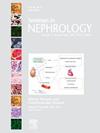Complexities in Variant Analysis, Classification, and Interpretation in Kidney Disease–Related Genes
IF 3.5
3区 医学
Q2 UROLOGY & NEPHROLOGY
引用次数: 0
Abstract
Advancements in chronic kidney disease (CKD) genetic research and next-generation sequencing have improved CKD diagnosis and personalized treatment. Broad gene panel testing or whole exome/genome sequencing has greatly improved understanding of the genetic etiology of kidney disease but has also increased the complexity of interpretation. Standardized variant classification guidelines help, but challenges remain due to subjective evidence and limited functional and phenotypic data. Careful consideration of genetic and clinical evidence, along with collaboration between clinicians, genetics experts, and laboratories, is essential for accurate interpretation and patient care. This article examines nephrology genetic testing, focusing on the complexities of variant analysis, classification, and interpretation. Variant classification in monogenic kidney diseases is crucial for accurate diagnosis and patient management. We outline the classification methods highlighting several variant examples using the ACMG/AMP framework and quantitative approaches for pathogenicity assessment. We highlight challenges in integrating genetic findings into nephrology and emphasize the clinical impact of accurate genetic diagnoses for precision medicine in CKD.
肾脏疾病相关基因变异分析、分类和解释的复杂性。
慢性肾脏疾病(CKD)基因研究和下一代测序的进展改善了CKD的诊断和个性化治疗。广泛的基因面板检测或全外显子组/基因组测序极大地提高了对肾脏疾病遗传病因的理解,但也增加了解释的复杂性。标准化的变异分类指南有所帮助,但由于主观证据和有限的功能和表型数据,挑战仍然存在。仔细考虑遗传和临床证据,以及临床医生、遗传学专家和实验室之间的合作,对于准确的解释和患者护理至关重要。这篇文章探讨了肾脏病基因检测,重点是变异分析、分类和解释的复杂性。单基因肾病的变异分类对准确诊断和患者管理至关重要。我们概述了分类方法,重点介绍了使用ACMG/AMP框架和定量方法进行致病性评估的几个变体示例。我们强调了将遗传学发现整合到肾脏病学中的挑战,并强调了准确的遗传学诊断对CKD精准医学的临床影响。
本文章由计算机程序翻译,如有差异,请以英文原文为准。
求助全文
约1分钟内获得全文
求助全文
来源期刊

Seminars in nephrology
医学-泌尿学与肾脏学
CiteScore
5.60
自引率
0.00%
发文量
27
审稿时长
6-12 weeks
期刊介绍:
Seminars in Nephrology is a timely source for the publication of new concepts and research findings relevant to the clinical practice of nephrology. Each issue is an organized compendium of practical information that serves as a lasting reference for nephrologists, internists and physicians in training.
 求助内容:
求助内容: 应助结果提醒方式:
应助结果提醒方式:


